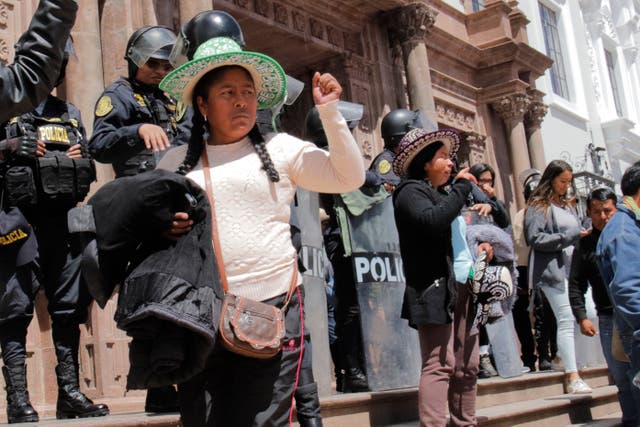‘Humiliation and discrimination’: Environmental defenders facing ‘unprecedented attacks’ in Latin America

Communities ‘are being killed as they seek to uphold their environmental, human and spiritual rights’, one defender tells The Independent
Frontline defenders of the land and natural world in Latin America faced “unprecedented attacks” from states and businesses in 2020, a new report says.
A record 264 human rights defenders were killed across the region last year, with more than 40 per cent of these murders linked to disputes over land, indigenous rights and the environment, research shows.
The new report, from the charity Catholic Agency for Overseas Development (Cafod), says the surge in deaths is linked to deepening inequalities fuelled by the Covid-19 pandemic.
“Human rights defenders are being killed as they seek to uphold their environmental, human and spiritual rights,” Luisa Fernanda Rodríguez Gaitán, an environmental defender and researcher at Colombia’s Centre for Research and Popular Education’s intercultural programme, told The Independent.
“For indigenous communities, there is a special connection between land, nature and human and spiritual rights. It can’t be divided.”
Ms Rodríguez works alongside environmental defenders in La Guajira, Colombia, which is home to Latin America’s largest open pit coal mine.
“The indigenous communities living near the mine have limited access to water – and the mine has contaminated almost all of it,” she said.
“As a woman, I’ve suffered humiliation and discrimination,” added Victoria, an environmental defender from Peru where, since the start of the Covid-19 pandemic, nine indigenous leaders have been murdered for defending the Peruvian Amazon, according to Cafod.
“I have been criminalised for nine years of my life. I have suffered from psychological abuse, low self-esteem, harassment, and unemployment. Alongside personal stress, there’s been the discrediting of my family.”

(CAFOD)
Cafod’s report draws on research published from 2019 to 2021 on the threats faced by environmental defenders across Bolivia, Brazil, Colombia, Guatemala, Honduras and Peru.
“In every corner of the globe, land and environmental human rights defenders are under attack, but these attacks are particularly acute in Latin America,” said Emily Mulville, report co-author and Latin America representative for Cafod.
“Faced with massive inequality and widespread impunity, they suffer violence, criminalisation, and stigmatisation, often with nowhere to turn for protection. This reality is unacceptable, outrageous and deadly.”
The findings come after a report from the UN released in March found that indigenous leaders in Latin America and the Caribbean protect around an eighth of the world’s tropical forest carbon.
Protecting and enhancing the rights of indigenous peoples and land defenders will be key to curbing tropical deforestation – which currently accounts for around 8 per cent of all human-cased CO2 emissions, it added.
In light of the findings, Cafod is calling on the UK government to set a new law to prevent British companies from having a negative impact on human rights and the environment in Latin America.
“The UK must ensure that businesses that have parent companies in the UK comply with international environmental standards, not just the national standards set in countries like Colombia, which are poor,” said Ms Rodríguez.
The charity added that more should be done to include environmental defenders in UN climate talks.
In November, the UK is due to host Cop26 – a major set of international talks that are widely seen as crucial to getting the world on track to limiting global warming to 1.5C above pre-industrial levels, the aspirational goal set by countries under the Paris Agreement.
“If the UK can communicate about the importance of the work of environmental defenders it would be so important for us because here people don’t understand,” Ms Rodríguez added.
A government spokesperson said: “We have taken steps to increase corporate transparency in supply chains as demonstrated by our commitment to eradicating modern slavery from the global economy. We will go further than ever before to clamp down on illegal deforestation and protect rainforests, thanks to world-leading new laws being introduced through the landmark environment bill.
“We actively encourage businesses to do their due diligence to identify, prevent and account for potential risks in their operations and throughout their supply chain relationships.”
6 July 2021
INDEPENDENT




